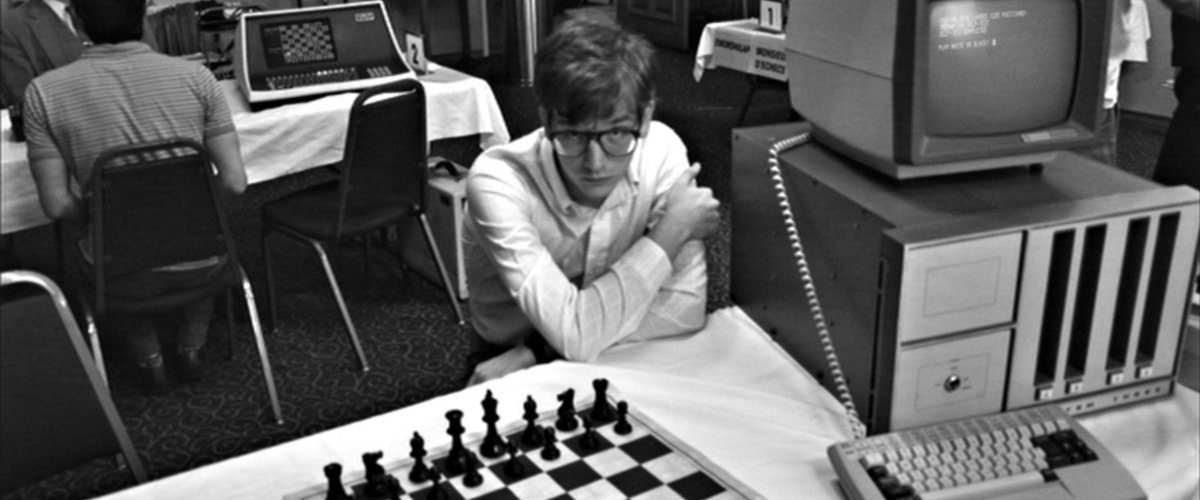Sunday, March 19, 2017
COMPUTER CHESS
I've never been anything but indifferent to computers. As for new streaming services where we can watch movies and listen to music, well, I still find myself struggling with internet connections, and any number of imperfections. I don't feel we've advanced that much since the days when my father would smack the side of our old Zenith television to fix the vertical hold, or when we'd wrap the antenna in tin foil to improve reception.
But there's a loud majority out there convinced that the invention of the computer is the most important thing since the invention of language. Sorry if I don't buy into it.
My grousing is prompted by a 2013 film that was a minor smash on the festival circuit and is now available on Fandor, an excellent movie streaming platform that only shits the bed once in a while. The title, simple enough, is Computer Chess, and in its best moments it is about the weirdness felt by those early programmers who were there at the beginning, the paranoia they may have felt, the loneliness they experienced late at night when the rest of the world was dancing and partying, while they stared into screens trying to solve problems of artificial intelligence, among the most pressing being the question of whether a computer could beat a human at chess.
It takes place at a convention for such would be adventurers - a host actually uses the term "adventure," and that seems apt for these types of people, who don't look as if they've ever journeyed beyond their zip code - where rivals compete to see who has designed the best chess program.
We get the usual types - the greasy haired nerd, the chubby guy wearing a shirt that doesn't fit, the cryptic loner, the angry dude who is too smart for the room, the one female who has an interest in computers, the British guy, and a potpourri of middle-aged professors who moan on and on about "their work," and how much they sacrifice.
Writer-director Andrew Bujalski took a lot of care with casting; he finds a lot of regular looking people, pear-shaped and spotty complexioned, and he dresses them in ways that remind us of old high school yearbooks, or photo albums from the 1970s. He takes the same care with the computers in the movie, big, honking desk models with the glowing screens. Some are so big they need two people to move them. Shot on black and white videotape, it's a great movie to look at; it looks, at times, like a documentary, and you won't be blamed if it takes you several minutes to realize it's not one.
Unfortunately, the movie doesn't want to take any great leaps. It sets up what could be an awesome and rarely tapped premise - the early days of computer programing - but instead settles for some cheap, and not very funny jokes. Apparently, the hotel hosting the computer chess tournament is also hosting a gathering of swingers, and a hippie-dippy self-help group. It doesn't take long for the computer nerds to start mingling with the swingers and the self-helpers, with predictable results.
And after a while, we can't tell one nerd from another; they all look the same.
If this sounds like a knock, it is. But the movie is watchable even when it loses its pulse. It has a fleeting resemblance to early Jim Jarmusch, and even a couple of flourishes that are downright Godard-like.
There are multiple stories going on at the hotel. There's an angry fellow who can't seem to get a reservation, and he wanders around in a state of mild rage until he finally winds up with the self-help group, reenacting his birth. There's a kid who thinks the computers actually take pleasure in competing against humans, and an older professor who tells a story of a computer that made him question the very existence of his soul.
Bujalski weaves the episodes together nicely, but if some of the movie hearkens back to Jarmusch's minimalism, some of it also feels like Westworld. The mix of tones isn't a complete success.
To his credit, Bujalski doesn't play up the obvious discomfort of the one woman in the computer group, and he doesn't turn her into a feminist powerhouse. She does, though, have a compelling scene where she imagines the people at the hotel all seem to be moving like chess pieces.
In a way, the movie reminded me of certain Robert Altman films where a crowd gathers for a concert, or a wedding; they interact, learn nothing, and move on. And we can almost imagine what Altman could've done with this, using actors like Bud Cort and Donald Sutherland as the hotshot computer techies. We know Altman would've focused on the human aspect. By moving away from the humanity of the characters and trying to make things weird, Bujalski just muddles it.
Worse, the characters are perfectly dressed, but not especially memorable. At the end of the weekend, when awards are being passed out, it means nothing because we don't know what these people were really all about, and we couldn't care less who wins or loses.
"Take something mediocre and turbocharge it," says one character, complaining abut the shoddy convention. This movie, though probably deserving of the many festival accolades it received a few years back, could've used some turbocharging.
Subscribe to:
Post Comments (Atom)

No comments:
Post a Comment